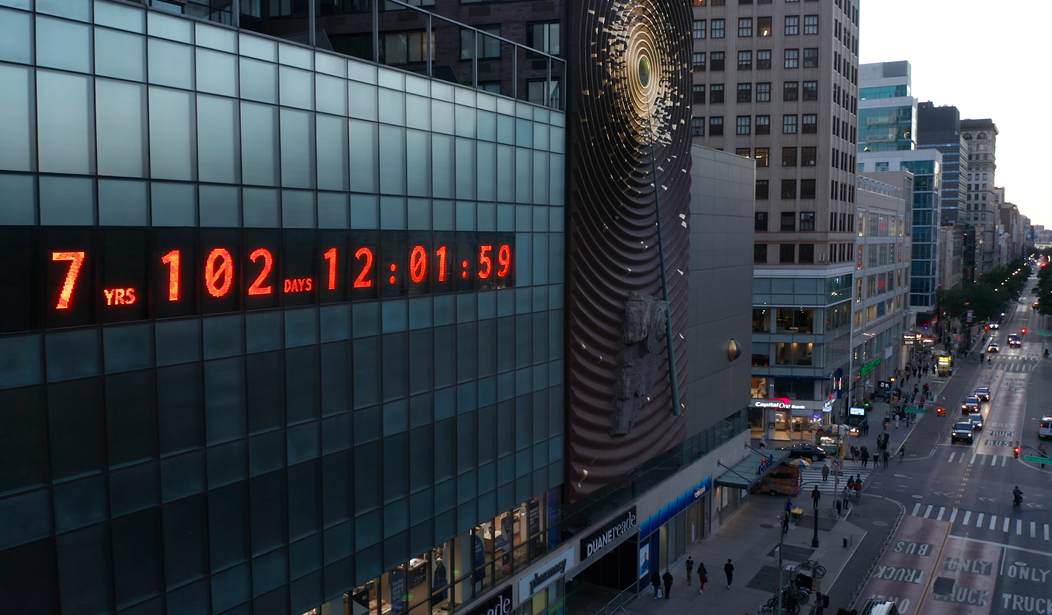Want to know why it's so easy to distinguish science from pseudoscience? Because, to anyone who has a knack for examining data, the latter is pretty easy to debunk. Nowhere is that more true than in the claims of the climate scolds, the claims that human use of fossil fuels is on the edge of sending our planet spinning into an inferno. Now, to insert my usual disclaimer: Yes, the climate does change. Yes, the climate has been warming, slightly and gradually, since the end of the last ice age, the Wisconsonian, which ended about 11,000 years ago. Yes, human activity does have some effect on the climate, some small effect among the immeasurable influences that can affect the vast, chaotic system, that is the planetary climate.
CBS Boston, though, feels differently, and they are trying to crunch some numbers to prove that Boston is suffering from unprecedented heat this summer. There's just one problem: It's utter horse squeeze.
Climate Realism's Anthony Watts has done some debunking, and it's worth reading.
In the CBS Boston (CBS-B) article titled “Is extreme heat the new normal in Boston? What hitting 102 degrees tells us about climate change,” Jacob Wycoff claims that Boston’s recent heat wave is a symptom of climate change and the “new normal.” This is misleading. In fact, long-term temperature records do not support the notion that heat waves are becoming more intense or more frequent in Boston or across the United States. Historical weather data shows that extreme heat events in Boston are neither unprecedented nor evidence of a climate emergency. The notion that a few hot days in June are proof of a systemic climate shift is simply not supported by the broader climate record.
Here's the problem: To arrive at this scary, newspaper-selling scenario, ABC Boston is relying on cherry-picking data from questionable sources. Sound familiar? It should; the climate scolds do it all the time.
It’s a familiar tactic: choose the most aggressive, worst-case emissions scenario and present it as destiny. Climate Central, the source for much of the CBS-B story, uses computer model projections based on RCP 8.5, for example. Yet as noted on Climate Realism, even the Intergovernmental Panel on Climate Change (IPCC) has stepped back from emphasizing RCP 8.5 as a likely pathway, recognizing that is implausible if not impossible.
This climate alarmist framing glosses over essential context: heat waves like the one Boston just experienced have happened before, well before recent increase in carbon dioxide emissions, and are often the result of local urbanization effects—not global climate trends.
Yes, the urban heat island effect is a thing.
Here's the thing: It turns out that pretty good records of temperatures in fixed locations around the Boston area are available going back to the late 19th century. The means of measuring temperatures back in those days was not quite as accurate as today, but they were accurate enough for us to establish if there had been any trend. So, using annual high temperatures from 1893 to date, a chart of that data leads to some interesting results:
— Ward Clark (@TheGreatLander) July 10, 2025
Here's my methodology - yes, that's my chart. Simply take the data for annual high temperatures in Boston from the linked source, which is Extreme Weather Watch, and paste it into an Excel spreadsheet. Then, a simple manipulation in Excel gives you the chart. Now, do you notice the straight, dotted line? That's the trendline, something which climate scolds rarely present unless it's in the form of a scary hockey stick graph. Notice what we can derive from that trendline:
It's trending upward - very slightly. There is an increase of what appears to be a degree to two degrees, over 132 years, during which - and this is important, for reasons I'll explain in a bit - Boston was increasingly urbanized.
Here's the other side of that story: As Mr. Watts informs us, the duration of heat waves hasn't changed much, either.
Nor are extended heatwaves new to Boston. In June 1872, Boston experienced eight days of temperatures above 90°F. Boston also had a multi-day stretch of 100-degree temperatures in July 1911, a heat wave that was deadlier and more extreme than what the city experienced in June 2025. That 1911 event resulted in numerous fatalities across the Northeast, a fact documented well before climate change became the default explanation for every summer hot spell.
I looked, but couldn't find any raw data to crunch for the duration of heat waves in Boston for the time frame involved, so we'll take Mr. Watts' word for it.
See Also: It's True: Climate Scolds Would Love to Shut You Up
Democrats Astonished by New Polling Showing Voters Don’t Care About Their Favorite Fake Crisis
Finally, CBS Boston (predictably) doesn't understand the urban heat island effect, which anyone who has studied climate issues for more than about two hours should know about by now.
The CBS-B article cites Climate Central’s claim that Boston’s overnight summer temperatures have increased by 2 degrees Fahrenheit over the past 50 years. But this trend is almost certainly influenced by the well-known Urban Heat Island (UHI) effect, which causes cities to retain more heat, especially overnight, due to heat-absorbing infrastructure like asphalt, concrete, and buildings. This is not a climate crisis; this is local urbanization.
The UHI effect is well-documented and accounts for much of the localized warming in urban centers. In fact, the National Oceanic and Atmospheric Administration (NOAA) acknowledges that “cities tend to be warmer than rural areas, particularly at night, because buildings, roads, and other infrastructure absorb heat during the day and release it slowly after the sun goes down.”
There's little hard evidence as to how much of that one-degree increase in annual high temps is due to the urban heat island effect, and in all fairness, Boston was already a pretty big town in 1893. But that doesn't change the overall conclusion - that CBS Boston is panic-mongering.
A degree in high temps - that's a temp recorded on one day per year, one unusually hot day - shouldn't be anything to send anyone into a tizzy. The facts are that our modern technological lifestyle has made life more comfortable than ever, hot days and cold days. Climate-related deaths are at historic lows, and more of those deaths are still due to cold, rather than warm temperatures. That's no surprise; we're a heat-adapted species.
So, relax. The planet isn't about to catch fire. CBS Boston is, to put it bluntly, blowing smoke.
This seems appropriate.














